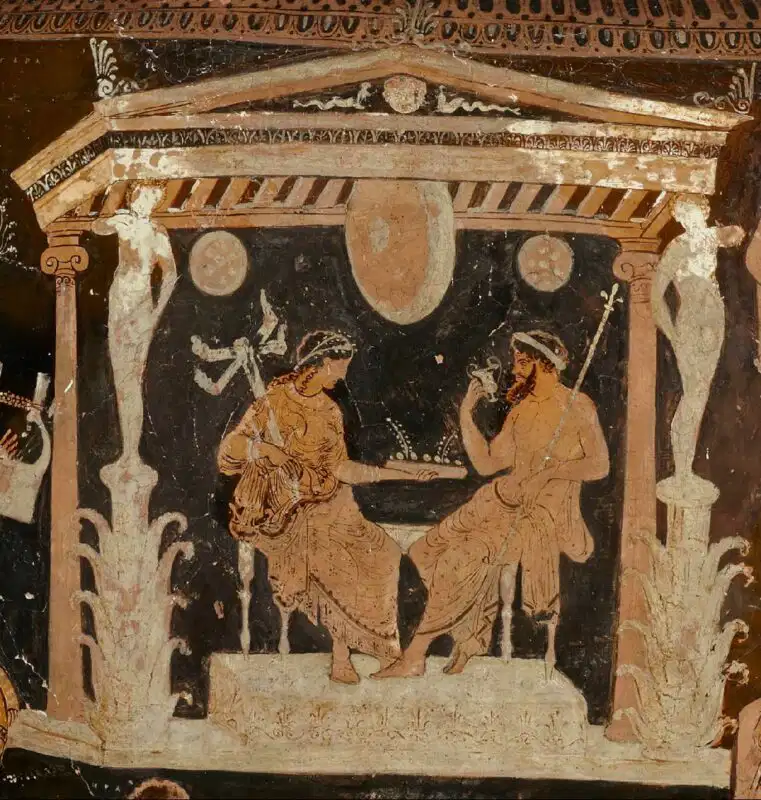
Hades is possibly the most misjudged and misinterpreted Greek god. Clash of the Titans, Disney’s Hercules, the Percy Jackson movie – the god Hades is the bad guy. In these adaptations of the Greek god Hades, renowned God of the Dead, he often seems to be up to mischief, concocting his latest evil plan and causing mayhem for all involved. Yet, in the Greek mythological canon, Hades hardly causes any trouble at all. In fact, he is one of the most peaceful and impartial gods. So why do most adaptations of Greek myth present Hades as the villain?
5. Greek God Hades: The Unseen

The Greek god Hades’ name, in Ancient Greek “᾽Αιδης”, derives from the Ancient Greek word for “unseen”. This is just the start of Hades’ pitiful story. The name’s meaning is fitting for Hades because his efforts often went unnoticed. To begin with, Hades helped his younger brothers, Zeus and Poseidon, to overthrow the monstrous Titan Kronos in the epic battle for control of the cosmos. When the rewards for the victors were divided, Zeus was given reign over the sky, Poseidon over the sea, Hades the Underworld. Despite some sources stating that the god Hades was unhappy with this decision, he never complained or sought a different role.
Despite Hades being born in the same generation as the other Olympian gods, he is excluded from the group, and so does not have the title ‘Olympian’. He does not have a home or sacred place on Olympus but instead is confined to his domain in the Underworld. Instead of the Olympian title, Hades has the title ‘Chthonic’, which roughly translates as ‘things relating to the underground’. So even in title, he is set apart from his peers.
Ironically, the Greek god Hades in Roman mythology is called Pluto, and in astronomy, Pluto was discounted as a planet. There’s an unfortunate pattern of exclusion here for the God of the Underworld.
Get the latest articles delivered to your inbox
Sign up to our Free Weekly NewsletterThe Greek god Hades did not have many shrines compared to the other major gods. He had one significant cult in Thesprotia, where there was an Oracle of the Dead. Not many Hades statues have been excavated which suggests that not many were made. Whilst other gods, for example, Aphrodite, are famous for becoming angry and violent if they are not worshipped, Hades is not recorded in any myth as taking vengeance on mortals for their ignorance.
4. Hades The Impartial, Judicious, And Fair

Despite Hades’ silence on his complaints in the Greek myths, films like Disney’s Hercules characterize Hades as vengeful and plotting the overthrow of Olympus. However, in Greek mythology, Hades never attempts to usurp any of the gods, especially Zeus, the King, but other gods do! Poseidon and a few of his fellow gods felt that Zeus was doing a terrible job as ruler of the universe and attempted to remove him from power. In this case, Hades was absent! Far from being the instigator, Hades was an impartial party.
Even in the epic battle, the Trojan War, Hades took neither side, unlike the gods who took sides with such enthusiasm that they wreaked more havoc than the humans. Meanwhile, Hades has to deal with the influx of souls in his domain due to all the deaths caused by his fickle fellow gods. Instead of causing the trouble, Hades has to deal with the fallout: an overcrowded Underworld!

This impartiality enabled Hades to maintain law and order fairly. In one myth, Pirithous wanted Persephone for his wife so he convinced his friend Theseus to help him try to kidnap the Queen of the Underworld. When Hades discovered them, he chained them to Chairs of Forgetfulness. Eventually, Theseus was released when Heracles came by, but Pirithous, the instigator, had to remain for his penance. This is quite a judicious reaction, as the mastermind behind the plan was punished for longer than the co-conspirator. Most gods would have killed them on the spot for trying to steal their wife!
Hades’ Judicial Qualities
Hades was immensely difficult to bribe, an ideal trait for a guardian of the dead. As Lord of the Underworld, he has to be quite cold-hearted because many people pleaded for their lost loved ones to be returned to life. In some myths, Hades is described as having an iron heart. The one time he was moved to compassion for someone else’s grief, he cried iron tears.

The Greek god Hades was trusted to judge the dead (along with his personal choice of jurors). Part of this job meant Hades had to keep the order of nature and maintain the cycle of life. When he punished people, it was not out of bitterness, jealousy, or revenge, but simply because they had upset the balance of life and death.
In one myth, Sisyphos first evaded death by arguing that he wasn’t buried properly, so Hades allowed him to leave the Underworld to fix this. Then, Sisyphos avoided death for the second time by entrapping Death when he came to take him back to the Underworld. This caused chaos because nothing could now die with Death hindered. Sisyphos was punished by having to roll a rock up a hill for eternity. Ironically, this punishment was dealt out by Zeus, again an override of Hades.
3. Hades and Persephone: Nobody’s Perfect

The contentious one: the kidnapping of Persephone. But should it be labeled that? Hades took Persephone from the mortal world and into the Underworld to be his wife. But in the Homeric Hymn to Demeter, it actually states that Hades had asked Zeus for permission to marry his daughter. So, by Ancient Greek standards, Hades had the right to take Persephone to be his wife in the Underworld. (Not so fair on the woman, but that was Ancient Greek culture).
Also, in most versions of the myth, Persephone voluntarily chose to eat the pomegranates that bound her to the Underworld forever. But Hades, considering how Demeter (Persephone’s mother) was upset about this, allowed Persephone to leave the Underworld for half the year, every year. Hades was not obligated to do this, but he did so.
This paints the god Hades not as a covetous kidnapper but as a man who followed Greek customs and even compromised to satisfy his mother-in-law. (A struggle indeed!)
2. Hades: The Most Loyal Greek God

The Greek god Hades is comparatively a better husband than his peer gods. Whilst Zeus and Poseidon – Hades’ brothers – are widely known for their affairs, Hades remained loyal to Persephone.
However, there are two cases in which Hades’ loyalty is questioned: Minthe and Leuce. But since there is no explicit timeline for these love trysts, they can reasonably be placed before Hades’ marriage to Persephone.
Leuce was an Ocean nymph with whom Hades fell in love and took to the Underworld. When her life came to its end, Hades changed her into a poplar tree in Elysium. The poplar tree also became a sacred symbol to Hades, which shows how Hades honored his relationship with her.
Minthe appears to be a past lover of the god Hades. The sources are unclear about the timeline, but it appears that when Hades married Persephone, Minthe became jealous. bragging that she would win back Hades as a lover. Hades appears in the myth not to respond to her claims. Persephone, however, retaliates by turning Minthe into a mint plant.
1. Hades the Helper of Heroes

As much as Hollywood portrayals like to suggest, Hades is never the villain in any Greek myth. On the contrary, Hades assists heroes when they come to him for aid.
For one of his Twelve Labours, Hercules comes to take Cerberus, Hades’ three-headed watchdog, to the land of the living. When Hercules gets an audience with Hades, the god allows the hero to take Cerberus ‘for a walk’ under the conditions that Cerberus is unharmed and brought back safely.
Bonus points for Hades: the name ‘Cerberus’ is considered by some to be related to the Proto-Indo-European word Kerberos which means “spotted.” Thus, Hades naming his dog ‘Spot’ earns him kudos.
In the case of Perseus, the hero who defeated the gorgon Medusa, the god Hades loaned him his Helm of Darkness. Perseus was able to use this helmet to turn invisible and easily slaughter the monsters on his quest. This is a stark contrast to Clash of the Titans which pits Hades against Perseus!

When Orpheus’ wife died, he traveled into the Underworld to try and get her back. On his way through the Underworld, Orpheus sang a sorrowful melody, accompanied by his lyre. After hearing the mournful tune, Hades was moved to pity for Orpheus and cried an iron tear. He allowed Orpheus to take his wife back to the land of the living. Hades even warned Orpheus not to look back at his wife until he had stepped out of the Underworld or her soul would be lost forever. Not his fault Orpheus didn’t listen…
The Greek god Hades is also the guardian of the heroes’ souls after they die. He rewards heroes with Elysium, the final resting place for those who lived good, honorable lives.
So, Why The Bad Image For The God Hades?

The depiction of the Greek god Hades in modern western culture, especially in film, is often attributed to the influence of Christianity. In Christianity, the lower world is often associated with Hell and the Devil. Since Hades also lives in an underworld space, he is often equated with the Devil. Western culture is heavily influenced by Christian values in its culture, so often the portrayal of Hades is influenced by a Christian perspective.
A significant part of Hades’ negative depictions is fear. Many people fear death, the unknown, and the idea of punishment in the afterlife. Since Hades rules over this aspect of existence, the fear expands to include the fear of Hades himself. Ironically, Hades is not even the god of Death, that title goes to Thanatos. Hades just oversees the management of the Underworld.

There’s no holding back in Ancient Greek myths about how undesirable Hades’ lot was! In Homer’s Odyssey (Book 11, lines 488-490), Achilles states,
“βουλοίμην κ᾿ ἐπάρουρος ἐὼν θητευέμεν ἄλλῳ,
ἀνδρὶ παρ᾿ ἀκλήρῳ, ᾧ μὴ βίοτος πολὺς εἴη,
ἢ πᾶσιν νεκύεσσι καταφθιμένοισιν ἀνάσσειν.”
“I’d rather slave on earth for another man –Some dirt-poor tenant farmer who scrapes to keep alive –
Than rule down here over all the breathless dead.”
Clearly, it’s a hard and unpleasant job to be Lord of the Underworld if being a slave is preferable. No one wants to be him or appreciates him, and yet the Greek god Hades continues to endure!








